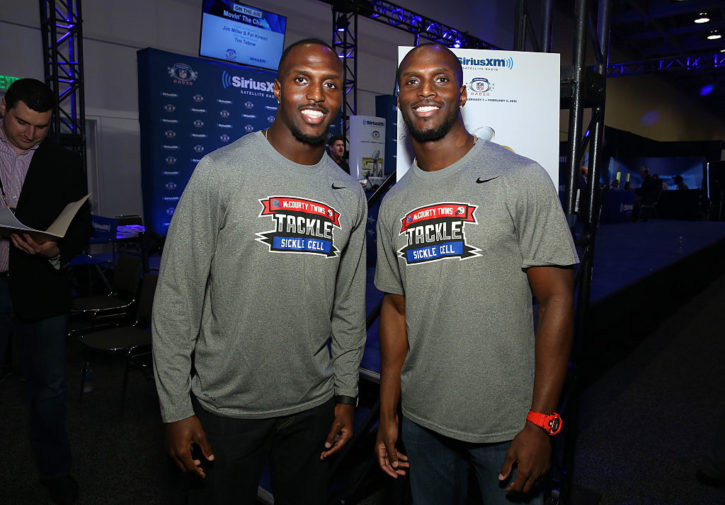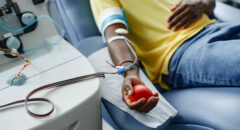
Growing up, twin NFL defensive backs Devin (New England Patriots) and Jason McCourty (Tennessee Titans) saw firsthand the challenges that can come with sickle cell disease (SCD). Their aunt inspired them to not only find ways to help support and empower her, but also the thousands of people in the U.S. living with the disease.
BlackDoctor.org recently spoke with the McCourty Twins, who are the Founders of the Tackle Sickle Cell campaign, about sickle cell disease, how it impacted their family and their work to bring more awareness to SCD.
BlackDoctor.org: How does someone get sickle cell disease?
Devin: Sickle cell disease is actually a hereditary blood disorder, so it’s not something you can catch or develop over time. It’s a chronic, life-long disease with many forms that can range in severity – some patients experience very mild symptoms, while it can be life-threatening for others.1 Our Aunt Winnie has lived with sickle cell her entire life; we’ve watched her battle this disease and seen her go through so much. She’s a true inspiration to us. She’s the reason why we started the Tackle Sickle Cell Foundation and stay so involved in the sickle cell community. Over the years, we’ve learned so much about the disease and how amazing the community is – they are so supportive of one another.
BlackDoctor.org: What does it mean to carry the sickle cell trait and how can someone learn if they have the trait?
Jason: A person can be a carrier of the sickle cell gene, but never experience any symptoms – this was the case for our dad. For a child to be born with sickle cell disease, both parents have to be carriers.1 A simple blood test can determine if you’re a carrier of the gene that could potentially be passed on to your children.
BlackDoctor.org: How does sickle cell disease affect the body?
Devin: Sickle cell symptoms vary by individual, but can include headaches, dizziness, fatigue, chronic pain, just to name a few. More serious complications include things like seizures and strokes.1 Patients are also at risk for a condition known as iron overload, which is an excess of iron in the body, that can be very serious. Some patients with sickle cell are treated with occasional or frequent blood transfusions. The transfusions can help increase the amount of normal shaped cells and restore normal blood flow,2 but frequent transfusions can also cause iron to build up in different parts of the body, and cause iron overload.3
BlackDoctor.org: Does sickle cell disease affect African Americans more than anyone else?
Jason: Sickle cell is definitely more common in African Americans than in other groups, accounting for about 1 out of every 365 African Americans born in this country. To get a sense of this, by comparison, it only occurs in about 1 in 16,300 Hispanic-American births – so you can see it’s a big difference.4 Most patients with sickle cell are from African descent, but it also occurs in people throughout the Mediterranean, Middle East, parts of India, the Caribbean, and South and Central America.5
BlackDoctor.org: How can those with sickle cell disease control their iron levels?
Jason: I know from our work with the community that it’s really important that patients with sickle cell track their iron levels so that they don’t develop iron overload. All this takes is a simple blood test that could be done as part of a regular appointment. We learned – and want others to know - that iron overload starts to develop after only 10 to 20 transfusions.6 When extra iron builds up in the organs, it can cause all sorts of problems that can even be life-threatening.
That’s why it’s important that patients work closely with their doctors to monitor iron overload as a part of their overall game plan. So definitely make sure you’re keeping track of your transfusions, too.
BlackDoctor.org: What are other tips for managing sickle cell disease to help make it easier?
Devin: The most important thing is working with your doctor to make sure you are on a treatment plan that works for you and your individual needs. Learn as much as you can about sickle cell – the more informed you are, the more you can advocate for yourself and your health. The sickle cell community is really amazing. There are great groups all over the country that are working to build awareness, raise funding for research and care, and spread the word about sickle cell disease. It’s a tight-knit community, and we have felt very fortunate to get to know so many members of that community over the years through Tackle Sickle Cell. Being a part of these communities, whether it’s in person or online, can really make a difference in terms of sharing information, and providing support and inspiration.
BlackDoctor.org: Can children with sickle cell disease play sports? If so, what can they do to be safe?
Jason: Absolutely. Each patient with sickle cell is different, so it’s really important to partner with your doctor and healthcare team. If you’re a parent of a child with sickle cell, have a discussion about which activities are safe for your child to participate in, and what measures you can take to make sure they are safe. Their health is always the top priority! We’ve met tons of kids and adults with sickle cell who are active, play sports and have lots of cool hobbies and interests.
Sickle cell is a part of who they are, but it doesn’t define them, or keep them from doing what they love.
BlackDoctor.org: What advice would you offer a teenager living with sickle cell disease?
Devin: For patients with sickle cell disease, the transition from pediatric to adult care is a critical time. Children and young adults with sickle cell disease receive exceptional care from their pediatric hematologists, but being more responsible and being your own advocate can be challenging. Being proactive, being knowledgeable and doing some research about how you and your HCP can to best manage treatment will help ensure you don’t miss a beat during this transition.
BlackDoctor.org: If you have a loved one with SCD, what are ways to be supportive?
Devin: Always be willing to lend an ear, and listen to them when they are sick, upset or frustrated. When you don’t have sickle cell yourself, it can be hard to truly understand what that person is going through. The more you listen, the more you’ll learn, and you can better understand how you can help them.
Jason: Many of the patients we talk to have said they often feel frustrated because they are told by others that they “don’t look sick.” It’s really sad to think that people living with chronic illnesses like sickle cell would be dismissed like that. Make sure that your loved ones with sickle cell know that you support them unconditionally, and will always be there to listen to them, and help them in any way you can.
Jason and Devin McCourty are twin professional football players and founders of Tackle Sickle Cell, a campaign that aims to educate the public, increase blood donations, and raise money and awareness for the fight against sickle cell disease. Tackle Sickle Cell is supported by Novartis Pharmaceuticals.
References
- 1. NHLBI. What Is Sickle Cell Disease? Last updated: August 2, 2016. Available from: http://www.nhlbi.nih.gov/health/health-topics/topics/sca. Accessed on August 18, 2016.
- 2. Ogedegbe, HO. Sickle cell disease: An overview. Laboratory Medicine. 2002(33):7:515-543.
- 3. Shander A, Cappellini MD, et al., Iron overload and toxicity: The hidden risk of multiple blood transfusions. Vox Sanguinis. 2009; 97, 185-197.
- 4. Centers for Disease Control and Prevention. Sickle Cell Disease Data & Statistics. Last updated: February 29, 2016. Available from: https://www.cdc.gov/ncbddd/sicklecell/data.html. Accessed on August 18, 2016.
- 5. American Association of Hematology. Sickle Cell Anemia. Available from: http://www.hematology.org/Patients/Anemia/Sickle-Cell.aspx. Accessed on August 18, 2016.
- 6. Remacha A, Sanz C, Contreras E et al. Guidelines on haemovigilance of post-transfusional iron overload. Blood Transfusion. 2013 (11):1:128-139. Available from: http://www.ncbi.nlm.nih.gov/pmc/articles/PMC3557483. Accessed on August 18, 2016.








